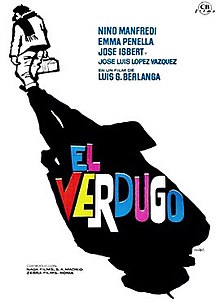This article needs additional citations for verification. (April 2024) |
The Executioner (Spanish: El verdugo) is a 1963 Spanish satirical dark comedy film directed by Luis García Berlanga. It was filmed in black and white, and is widely considered a classic of Spanish cinema. The film won several awards, both in Spain and internationally.
| The Executioner | |
|---|---|
 Poster | |
| Directed by | Luis García Berlanga |
| Screenplay by | Luis García Berlanga Rafael Azcona Ennio Flaiano |
| Story by | Luis García Berlanga Rafael Azcona |
| Produced by | Naga Films Zebra Films |
| Starring | Nino Manfredi Pepe Isbert Emma Penella José Luis López Vázquez |
| Cinematography | Tonino Delli Colli |
| Edited by | Alfonso Santacana |
| Music by | Miquel Asins Arbó |
Release date |
|
Running time | 90 minutes |
| Countries | Spain Italy |
| Language | Spanish |
Plot
editAmadeo, an executioner in Madrid, meets José Luis, a funeral parlour employee who is going to pick up the prisoner that Amadeo has just executed. José Luis cannot find a girlfriend, since all girls leave him when they find out that he works in a funeral parlour. Amadeo's daughter, Carmen, cannot find a boyfriend, because all the candidates leave when they find out that her father is an executioner. Carmen and José Luis get to know each other and start a relationship that they declare to Amadeo when Carmen becomes pregnant.
Amadeo hopes that the government will give him a flat (given that he is a civil servant), but they refuse it because by the time they give it to him, he will be retired. He and his daughter trick José Luis into accepting the role of executioner to keep the housing, assuring him that he won't have to kill anybody. When an order arrives for an execution in Mallorca, José Luis is horrified and wants to resign, but this would mean losing the flat and returning the salary he has earned. Amadeo and Carmen tell him to wait until the final moment, since the prisoner is ill and will surely die before being executed. In the end, José Luis is dragged to the execution in despair, as if he were the convict instead of the executioner.
Cast
edit- Nino Manfredi as José Luis Rodríguez, the undertaker
- Emma Penella as Carmen, the daughter of Amadeo
- José Isbert as Amadeo, the executioner (as Jose Isbert)
- José Luis López Vázquez as Antonio Rodríguez, the older brother of José Luis
- Ángel Álvarez as Álvarez, an undertaker, Rodríguez's colleague (as Angel Alvarez)
- Guido Alberti as director of the prison
- Julia Caba Alba as Mujer visitante de la obra nº 2
- María Luisa Ponte as Estefanía (as Maria Luisa Ponte)
- María Isbert as Ignacia (as Maria Isbert)
- Erasmo Pascual
- Xan das Bolas as Guarda de la obra
- José Orjas (as Jose Orjas)
- José María Prada (as Jose Maria Prada)
- Félix Fernández as Monaguillo nº 2 (as Felix Fernandez)
- Antonio Ferrandis
Real events
editThe final scene is inspired by the execution of Pilar Prades Expósito, carried out by the executioner Antonio López Sierra. Curiously, years after, José Monero also accepted the role of executioner, convinced that he wouldn't have to act, and wanted to resign when he was required for the execution of Heinz Ches, which he eventually carried out.
Awards
editThe film won the FIPRESCI Prize at the Venice Film Festival in 1963.[1] At that moment, Francoist Spain was under international pressure because of the death sentence for the Communist leader Julián Grimau. The Spanish ambassador to Italy, Sánchez Vega, criticized the film as "communist."
Box office and reception
editThe film took an estimated gross of ₧ 4,107,300 in Spain and there were some 32,907 viewers in cinemas across the country.
See also
editReferences
edit- ^ "The Executioner". MUBI.
External links
edit- The Executioner at IMDb
- The Executioner: By the Neck an essay by David Cairns at the Criterion Collection